标签:
获取数据库自动生成的主键
【孤立的技术是没有价值的】,我们这里只是为了了解具体的实现步骤:我们在插入数据的时候,经常会需要获取我们插入的这一行数据对应的主键值。
具体的代码实现:
1 /** 2 * 获取数据库自动生成的主键 3 */ 4 @Test 5 public void testGetKeyValues(){ 6 Connection connection=null; 7 PreparedStatement preparedStatement=null; 8 ResultSet rs=null; 9 try { 10 connection=JDBCTools.getConnection(); 11 String sql="insert into customers(name,email,birth)"+ 12 " values(?,?,?)"; 13 // preparedStatement=connection.prepareStatement(sql); 14 //我们这里使用重载的prepareStatement(sql,flag)方法 15 //来生成prepareStatement对象 16 preparedStatement=connection.prepareStatement(sql, Statement.RETURN_GENERATED_KEYS); 17 preparedStatement.setString(1, "ABCDE"); 18 preparedStatement.setString(2, "abcd@guigu.com"); 19 preparedStatement.setDate(3, new Date(new java.util.Date().getTime())); 20 preparedStatement.executeUpdate(); 21 //通过getGeneratedKeys方法获取包含了新生成的主键的ResultSet对象 22 //在ResultSet结果集中,只包含一列,列名:GENERATED_KEY,用于存放新生成的主键值 23 rs=preparedStatement.getGeneratedKeys(); 24 if(rs.next()){ 25 System.out.println(rs.getObject(1)); 26 } 27 ResultSetMetaData rsmd=rs.getMetaData(); 28 for(int i=0;i<rsmd.getColumnCount();i++){ 29 System.out.println(rsmd.getColumnName(i+1)); 30 } 31 } catch (Exception e) { 32 e.printStackTrace(); 33 }finally{ 34 JDBCTools.release(rs,preparedStatement,connection); 35 } 36 }
处理Blob
Blob的基本概念
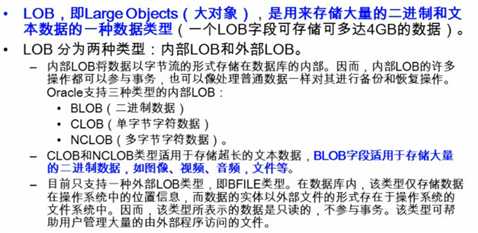
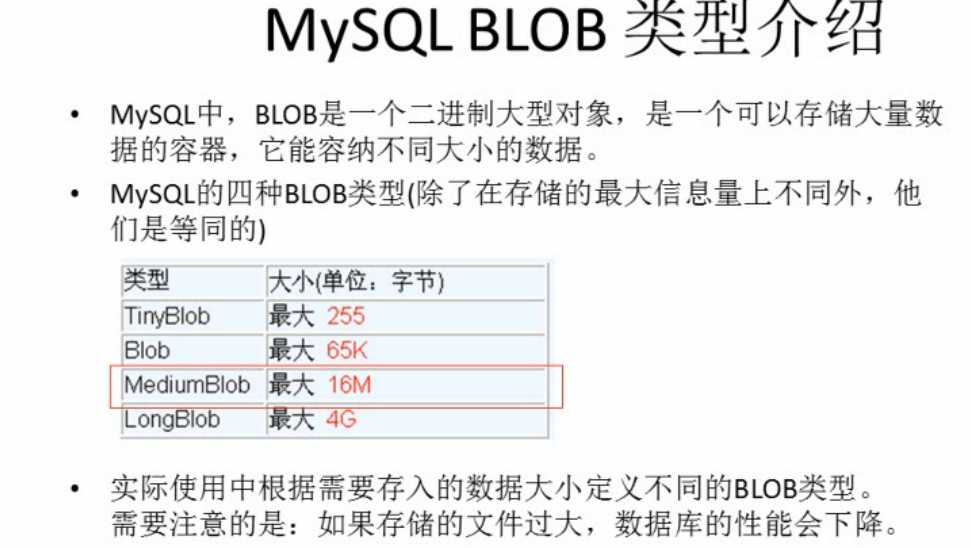
1).插入Blob类型数据
/** * 插入Blob类型的数据必须使用PreparedStatement * 因为Blob类型的数据是无法使用字符串拼写的 * * 调用setBlob(int index,InputStream,inputStream) */
具体代码实现:
1 @Test 2 public void testInsertBlod(){ 3 Connection connection=null; 4 PreparedStatement preparedStatement=null; 5 ResultSet rs=null; 6 try { 7 connection=JDBCTools.getConnection(); 8 String sql="insert into customers(name,email,birth,picture)"+ 9 " values(?,?,?,?)"; 10 // preparedStatement=connection.prepareStatement(sql); 11 //我们这里使用重载的prepareStatement(sql,flag)方法 12 //来生成prepareStatement对象 13 preparedStatement=connection.prepareStatement(sql); 14 preparedStatement.setString(1, "ABCDE"); 15 preparedStatement.setString(2, "abcd@guigu.com"); 16 preparedStatement.setDate(3, new Date(new java.util.Date().getTime())); 17 InputStream inputStream=new FileInputStream("blob.png"); 18 preparedStatement.setObject(4, inputStream); 19 preparedStatement.executeUpdate(); 20 21 } catch (Exception e) { 22 e.printStackTrace(); 23 }finally{ 24 JDBCTools.release(rs,preparedStatement,connection); 25 } 26 }
2).读取Blob类型数据
/** * 读取Blob数据: * 1.使用getBlob方法,读取Blod对象 * 2.调用Blob的getBinaryStream()方法得到输入流,再使用IO操作即可 */
具体代码实现:
1 @Test 2 public void testReadBlob(){ 3 Connection connection = null; 4 PreparedStatement preparedStatement = null; 5 ResultSet resultSet = null; 6 try { 7 connection = JDBCTools.getConnection(); 8 String sql = "select id,name,email,birth,picture"+ 9 " from customers where id =18"; 10 preparedStatement = connection.prepareStatement(sql); 11 resultSet = preparedStatement.executeQuery(); 12 if (resultSet.next()) { 13 int id=resultSet.getInt(1); 14 String name=resultSet.getString(2); 15 String email=resultSet.getString(3); 16 System.out.println(id+":"+name+":"+email); 17 Blob pictureBlob=resultSet.getBlob(5); 18 InputStream inputStream=pictureBlob.getBinaryStream(); 19 OutputStream out=new FileOutputStream("flo.png"); 20 byte[] buffer=new byte[1024]; 21 int len =0; 22 while((len=inputStream.read(buffer))!=-1){ 23 out.write(buffer,0,len); 24 } 25 out.close(); 26 inputStream.close(); 27 } 28 } catch (Exception e) { 29 e.printStackTrace(); 30 } finally { 31 JDBCTools.release(resultSet, preparedStatement, connection); 32 } 33 }
数据库事务
数据库事务概述
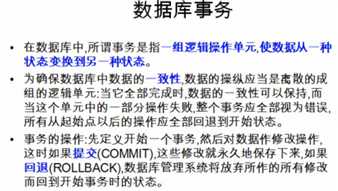
数据库事务的四个属性
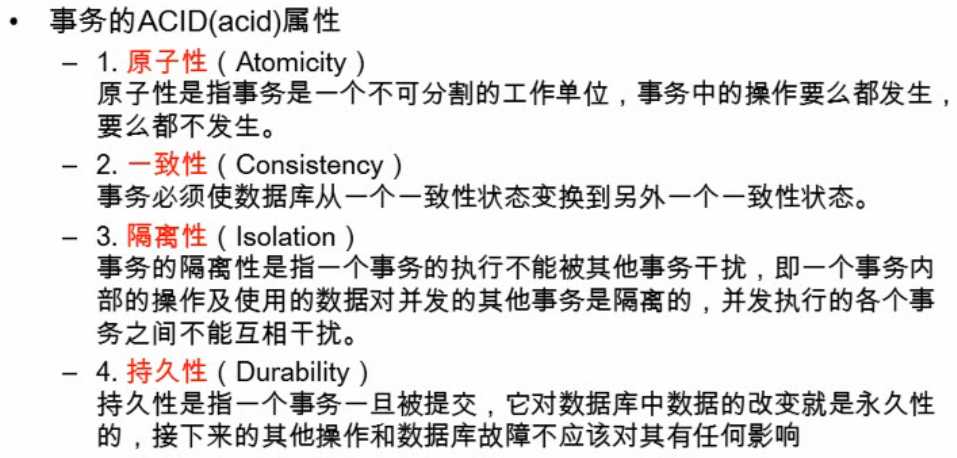
JDBC的数据库事务
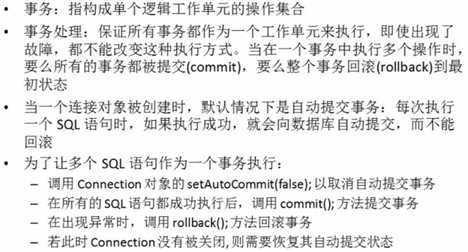
我们做一个小实验:
先建立一个数据表:

试验中要用到的更新数据的通用方法update():
1 public static void update(Connection connection,String sql, 2 Object ...args){ 3 /** 4 * 执行SQL语句,使用PreparedStatement 5 */ 6 PreparedStatement preparedStatement=null; 7 try { 8 preparedStatement=connection.prepareStatement(sql); 9 for(int i=0;i<args.length;i++){ 10 preparedStatement.setObject(i+1, args[i]); 11 } 12 preparedStatement.executeUpdate(); 13 } catch (Exception e) { 14 e.printStackTrace(); 15 }finally{ 16 JDBCTools.release(null, preparedStatement, null); 17 }
我们要完成的是:Tom->Jerry汇款500元
* 数据库事务
* 关于事务:
* 1.如果多个操作,每个操作使用的是自己的单独的连接,则无法保证事务
* 2.具体步骤:
* 1).开始事务,取消默认自动提交行为
* 2).如果事务的操作都成功,则提交事务:connection.commit();
* 3).回滚事务:若出现异常,则在catch块中回滚事务
我们组织代码就按照上面的步骤来进行.
1 public void testTeansaction() throws Exception{ 2 Connection connection=null; 3 try { 4 connection=JDBCTools.getConnection(); 5 System.out.println(connection.getAutoCommit()); 6 String sql="update users set balance=balance-500 where id=1"; 7 //开始事务:取消默认提交 8 connection.setAutoCommit(false); 9 update(connection,sql); 10 int i=10/0; 11 System.out.println(i); 12 sql="update users set balance=balance+500 where id=2"; 13 JDBCTools.update(sql); 14 //提交事务 15 connection.commit(); 16 } catch (Exception e) { 17 e.printStackTrace(); 18 //回滚事务 19 try { 20 connection.rollback(); 21 } catch (SQLException e1) { 22 e1.printStackTrace(); 23 } 24 }finally{ 25 //关闭连接 26 JDBCTools.release(null, null, connection); 27 } 28 }
可以发现,因为我们使用的是同一个connection连接,当异常(除数为0)发生的时候,事务会发生回滚,数据库的数据会恢复到事务开始之前的状态.
JDBC学习笔记(6)——获取自动生成的主键值&处理Blob&数据库事务处理
标签:
原文地址:http://www.cnblogs.com/ysw-go/p/5467025.html